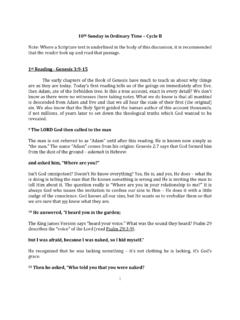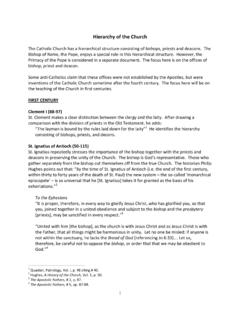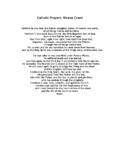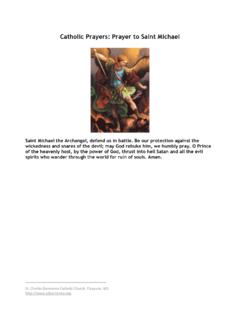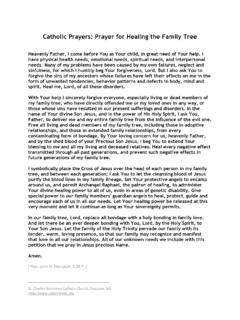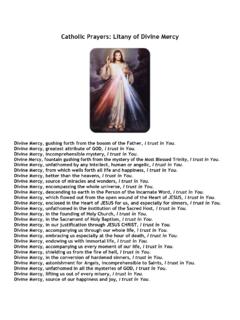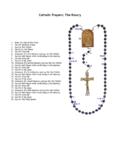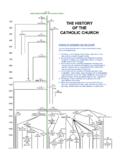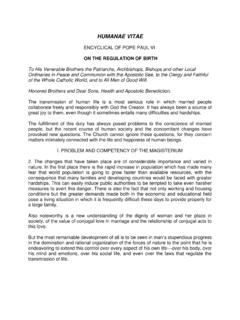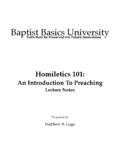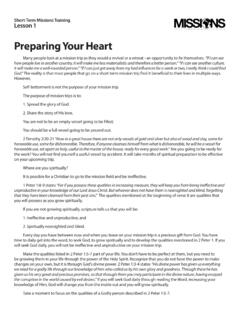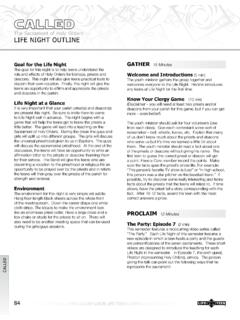Transcription of Solemnity of the Ascension of Our Lord - Cycle B
1 1 solemnity of the ascension Cycle B Note: Where a Scripture text is underlined in the body of this discussion, it is recommended that the reader look up and read that passage. Introduction The revelation we celebrate on this day is that the direct experience of God revealed to men and women in Jesus of Nazareth continues to be experienced when the Body of Christ, the Church, gathers in witness, love and mission. Jesus brought power and hope to people. As He talked, healed, and loved them, they felt the direct presence of God. To be in the company of Jesus was to be in the company of God. Jesus appeared to His disciples after His resurrection. Those appearances were more than their seeing a vision or acknowledging that death could not destroy the Lord. In His appearances Jesus told His disciples that the faithful would continue to experience His presence even though they could no longer see Him.
2 The Holy Spirit would make them aware and sensitive to that presence in the Eucharist. They would feel the same healing power freeing them from their enslavement to sin and guilt. Their vision of life would be enlarged as they grew in their covenant relationship with God. To say My life has significance because I am a child of God called to carry out His will in my life is to make a statement that opens one s life to new power and possibilities. Experiencing Jesus the Christ, in other words, was not to cease with the death of Jesus or with the last of His resurrection appearances. The experience would continue among the faithful. The power and presence of Christ are eternal experiences, not limited to time and space. The presence of Christ is as much our experience as it was the experience of the disciples.
3 Christ reigns eternally with God, the creative power who calls us into being. As we say in the Creed .. He ascended into heaven and is seated at the right hand of the Father. 1st Reading - Acts 1:1-11 Acts has been called The Gospel of Luke, Volume 2 in that it takes over from where St. Luke stopped when writing his gospel with the Ascension forming the hinge point. St. Luke, an educated man, a physician by profession, was meticulous and orderly. He sets out in Acts, under the inspiration of the Holy Spirit to prove the truth of the Apostles teaching and show how rapidly that teaching spread. It recounts the Church s expansion which, particularly among the Gentiles, was marked by miracles; thus bearing out what our Lord had foretold: You shall receive power when the Holy Spirit has come upon you; and you shall be my witnesses in Jerusalem and all Judea and Samaria and to the ends of the earth (Acts 1:8).
4 Today s reading, which documents Jesus Ascension , records Jesus last words to His disciples which includes this foretelling of the expansion of His Church. 2 1:1 In the first book, The Gospel of Luke Theophilus, Who Theophilus is, is unknown although both Luke s gospel and this book are addressed to him. I dealt with all that Jesus did and taught 2 until the day he was taken up, after giving instructions through the holy Spirit to the apostles whom he had chosen. 3 He presented himself alive to them by many proofs after he had suffered, Greek: paschein - usually translated as passion, is translated here as suffered. It refers to Jesus integral passion-death experience. appearing to them during forty days and speaking about the kingdom of God.
5 Forty in Hebrew numerology is a number representing transition/change. Forty years is a generation; the flood was 40 days and 40 nights; Moses was on the mountain for 40 days; the Hebrews wandered in the desert for 40 years; Jesus was tempted for 40 days. 4 While meeting with them, he enjoined them not to depart from Jerusalem, but to wait for the promise of the Father about which you have heard me speak; Luke 24:49 I am going to send you what my Father has promised; but stay in the city until you have been clothed with power from on high. 5 for John baptized with water, but in a few days you will be baptized with the holy Spirit. This refers back to John s statement in Luke 3:16 (or Matthew 3:11) I baptize you with water for repentance. But after me will come one who is more powerful than He will baptize you with the Holy Spirit and with fire.
6 This precisely demonstrates the prophecy s fulfillment and makes John the Baptist the herald of the Church as well as of the Messiah. 6 When they had gathered together they asked him, Lord, are you at this time going to restore the kingdom to Israel? This question is of present concern to Luke s community. What is being stressed as the disciple s mistaken hope is not a worldly, nationalistic kingdom as much as a hope of an immediate parousia, to which the outpouring of the Spirit was to lead. 7 He answered them, It is not for you to know the times or seasons that the Father 3 has established by his own authority. It is the preoccupation of an impending parousia that Jesus corrects, not the idea of Israel s restoration (see also Mark 13:32; 1 Thessalonians 5:1-3).
7 8 But you will receive power when the holy Spirit comes upon you, The Spirit is the substitute for the parousia. The Spirit is the principle of continued Christian existence in a new era of sacred history, the era of the Church and mission. and you will be my witnesses in Jerusalem, throughout Judea and Samaria, and to the ends of the earth. Jerusalem is the geographic center of sacred history and the influence of the Church will spread in three geographical stages: Jerusalem; Judea and Samaria; the ends of the earth. 9 When he had said this, as they were looking on, he was lifted up, and a cloud took him from their sight. A visible departure 10 While they were looking intently at the sky as he was going, suddenly two men dressed in white garments stood beside them.
8 Luke does everything in twos. This brings to mind the finding of the empty tomb in Luke 24:4 and the transfiguration in Luke 9:30; especially the empty tomb where they ask why do you look for the living among the dead? . 11 They said, Men of Galilee, why are you standing there looking at the sky? This Jesus who has been taken up from you into heaven will return in the same way as you have seen him going into heaven. The Ascension is a prefiguration of the parousia. 2nd Reading - Ephesians 1:17-23 Toward the end of his second missionary journey (in the year 52) Saint Paul stayed for a while in Ephesus (Acts 18:19ff), one of the great cities of Asia Minor, where he preached and founded the church to which this letter is addressed. Shortly after this, a distinguished personality, Apollos, appeared in Ephesus; he received instruction from Aquila and his wife Priscilla, two disciples of Paul (Acts 18:24-26) and he, in turn, prepared the ground for Paul s preaching on his third missionary journey (54-56).
9 Paul s visit was not without incident (Acts 19-20): he was forced to leave the city because of an uproar caused by Demetrius the silversmith. Paul did not forget the Ephesians, however, and, from Rome, he wrote them this letter. Paul s main purpose in writing seems to be to explore the 4 great mystery of the redemption, of which Christ Himself is the cornerstone, the foundation of the entire spiritual building into whom all Christians should be built. What we hear described in today s reading is Jesus position in heaven after the Ascension . 17 [May] the God of our Lord Jesus Christ, the Father of glory, The phrase Father of glory occurs only here in the New Testament, but Acts 7:2 calls Him God of glory and 1 Corinthians 2:8 says Lord of glory. give you a spirit of wisdom and revelation resulting in knowledge of him.
10 Not knowledge merely of God s plan, but knowledge of Him , an experience of God s great love for men in Christ that would be visibly shown in a true brotherhood of men. 18 May the eyes of (your) hearts be enlightened, that you may know what is the hope that belongs to his call, what are the riches of glory in his inheritance among the holy one The members of His Church. Not only the Church on earth (Church Militant) but in purgatory (Church Suffering) and in heaven as well (Church Triumphant). 19 and what is the surpassing greatness of his power for us who believe, God s mighty power overcomes humanly impossible obstacles. in accord with the exercise of his great might, 20 which he worked in Christ, raising him from the dead and seating him at his right hand in the heavens, The raising and seating are one continuous action.

